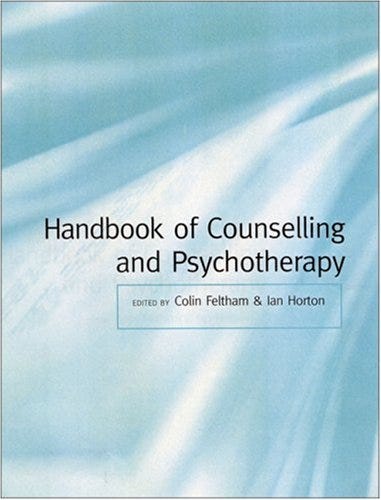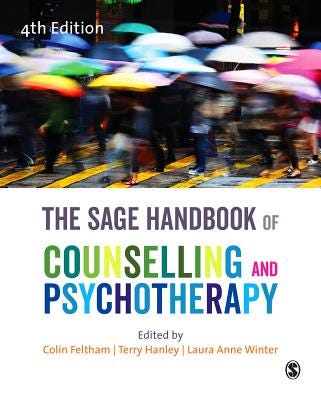Many years ago, probably in 2011 (I’ll keep vague as I can’t really remember), Colin Feltham asked Laura Winter and I to join the editorial team of the Sage handbook of counselling and psychotherapy. What an amazing thing to be asked to do (I thought) and jumped at the chance. This is a book that I had used earlier versions of in my own training - the first edition of this beast was published in the year 2000 by Colin and his colleague Ian Horton - and it has been a stalwart text on the shelves of organisations I have worked for and reading lists of courses I have taught on ever since. It was very flattering to be asked for sure, and a little surreal. Once the flattery had subsided and we had signed on the dotted line, the enormity of the task we had just agreed to started to sink in! Some months later, in 2013, the 4th edition was born.



Skip on a few years, probably 2021 (again I can’t really remember), Susannah from Sage emailed us once again. Are we willing to edit the handbook again? Colin had already decided that the 4th edition was to be his swan song, and so this time it would just be Laura and I overseeing the task. We thought it over. In fact, we thought it over for quite a while this time around. Despite the memories of the challenges of the 4th edition, it was however such a brilliant opportunity, that started the ball rolling again.
Below are a few of the ups and downs associated with editing such a huge tome over the past year and a bit.
The ups
The people - This comes top of the ups. We worked with over 100 authors on the latest edition of the handbook. Some of these authors are individuals who have contributed to the text since the first edition, others were new to it. As a consequence, it was lovely to reconnect with individuals once again and, where necessary, to make new connections with new authors. This equated to an awful lot of emails!
The content - Who needs CPD events, when you have to read through so many updated chapters! Of course, I understand that these are very different things, but having to dip into so many worlds has been fascinating and, well, eye opening. What a huge world we inhabit as therapists. The authors, all of whom are incredibly experienced professionals, were tasked with writing relatively brief summaries about their areas of interest. Without doubt, they have done so, as they have in previous editions, in thoughtful and engaging ways. As a consequence, it was such a privilege to read all of the contributions and to soak in the new developments each individual perceived within their particular area of the counselling and psychotherapy world.
The satisfaction - Whilst a huge task, imagine finishing it. You can sit down, have a cup of coffee, flick through the pages and go, I helped make that happen. It’s not in my hands quite yet, but I can smell the coffee :).
The downs
I should have probably ended with the positive side of things, but hey ho. Laura would also no doubt flag other things, but these were three of my low points of editing the handbook
The audits - From the start of this process we created a list of chapters. I’ve just had to count them again. In the end there are 104 chapters! Throughout we had to check which chapters had come in and which authors might need a nudge. The audit process seemed to have a life of its own and organically spasmed through the whole editorial process. Elements were ticked off at one stage, only to start being reviewed again during the next. It was tedious, but, ultimately, everything was ticked off.
The thousands and thousands of words - 104 chapters is pretty big. I’ve been involved in book projects before. They’re usually about 80,000 words. That’s pretty big, but this is another level. I can’t remember where we got to, but I think it was close to 400,000 words. Whilst fulfilling, that’s still a lot of reading.
The headaches of editing - The final point I’d flag is the headaches around editing generally. You’ve reviewed the chapters to ensure that the content fits the brief and reads well, but is that a missing full stop? Or has that reference got all of the correct information? It’s a minefield. Fortunately, we were also helped by a copy editor, but I will forever be haunted by the misuse of possessive apostrophes.
The beast awakens
So, as this new edition of the beast hits the shelves of the bookstore near you, maybe take a look. In fact, please do. It is the end product of so many hours of work. I’m sure that you’ll find something of interest in it.
If you fancy buying a copy that would be brill. If you’re not keen on Amazon due to their dubious record of paying tax, then maybe buy it from the nice book store that you looked at the hard copy. You can also get it direct from Sage here. I’m told that if your whisper the magic words UK23AUTHOR into the payment bit managed by the pixies at the end of the process you should also get 25% off.
If you fancy reading a copy, but don’t have the funds (it’s pretty expensive and food and heating has to come first) then maybe request it for your library (community or academic). I’m sure it’ll be well used (and I feel OK saying that, as most of the content has been written by my brilliant colleagues).




